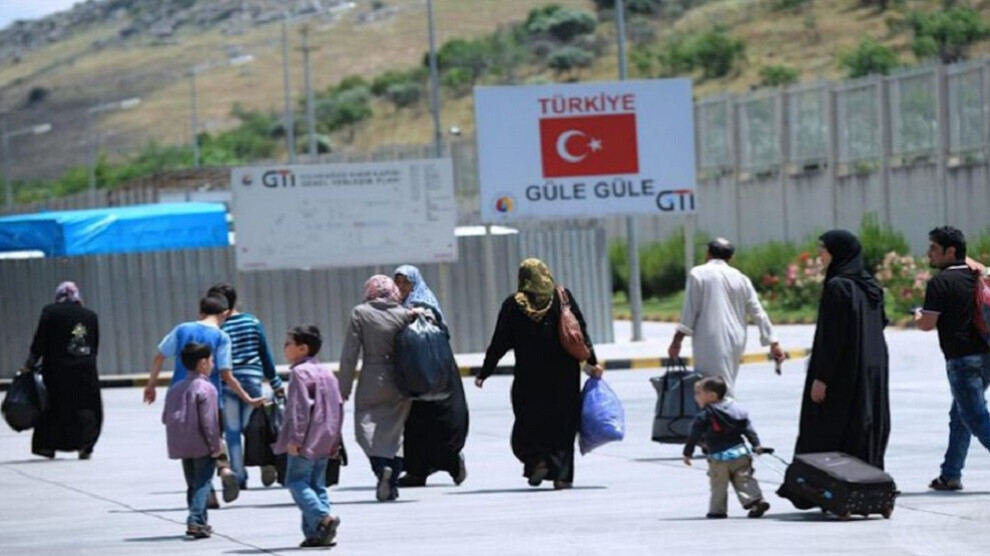HRW: Syrians face dire conditions in Turkish-occupied ‘Safe Zone’
Between January and December 2023, Turkish authorities deported 57,519 Syrians and others over its border crossings, including 16,652 through the Tel Abyad crossing.
Between January and December 2023, Turkish authorities deported 57,519 Syrians and others over its border crossings, including 16,652 through the Tel Abyad crossing.

Turkish authorities are deporting or otherwise pressuring thousands of Syrians to leave the country to Tel Abyad, a remote Turkish-occupied district of northern Syria where humanitarian conditions are dire, Human Rights Watch said.
Between January and June 2023, the Tel Abyad (Gire Spi) border crossing administration published monthly or daily numbers of Syrian returnees on its Facebook page, labeling all as voluntary. An analysis of the page reveals an over twofold increase compared to the same period in 2022. While Turkey in the past maintained that all returns are voluntary, Human Rights Watch research has found that Turkish forces have, since at least 2017, arrested, detained, and summarily deported thousands of Syrian refugees, often coercing them into signing “voluntary” return forms and forcing them to cross into northern Syria. Turkish authorities did not respond to a letter Human Rights Watch sent on February 1 sharing research findings and requesting information.
“Turkey’s ‘voluntary’ returns are often coerced returns to ‘safe zones’ that are pits of danger and despair,” said Adam Google, deputy Middle East and North Africa director at Human Rights Watch. “Turkey's pledge to create ‘safe zones’ rings hollow as Syrians find themselves forced to embark on perilous journeys to escape the inhumane conditions in Tel Abyad.”
Human Rights Watch has seen border crossing statistics from Turkey into Syria provided by an informed source, revealing discrepancies with data published on the official Facebook pages of the three operational border crossing administrations in categorizing returns. The statistics provided reveal that between January and December 2023, Turkish authorities deported 57,519 Syrians and others over its border crossings, including 16,652 through the Tel Abyad crossing. Analysis of official page data show variations in reporting practices, with one crossing, Bab al-Hawa, distinguishing between returnees and deportees, which match the statistics shared with Human Rights Watch, while the Bab al-Salama and Tel Abyad crossings do not.
According to the informed source, staff at all three border administrations interview every returnee and collect data, including on reason for return, but Turkish officials have successfully pressured the Bab al-Salama and Tel Abyad border administrations not to publish deportation numbers. This has left Bab al-Salama, since at least September 2022, categorizing all returns as simply “returns” and Tel Abyad, since at least January 2021, categorizing all returns as “voluntary.” Before September 2022, Bab al-Salama used to publish how many of the overall returns were voluntary. Tel Abyad stopped publishing data on returns in June 2023.
In 2023, Turkey increased the number of Syrians it sends back via Tel Abyad, which has been under the control of the Turkish-backed Syrian National Army since 2019. Turkey says it aims to turn areas of northern Syria under its control, including Tel Abyad, into “safe zones,” but in reality, these areas are rife with human rights abuses. Turkey’s incursion into the 150 kilometer-long strip of land between Raqqa and al-Hasakeh provinces displaced hundreds of thousands of people, forcing them to flee their homes.
In May 2022, Turkish President Recep Tayyip Erdoğan announced a plan to create a “safe zone” in the Turkish-occupied territories of northern Syria and build homes to accommodate up to one million Syrians living in Turkey. A Human Rights Watch report published on February 29 documented serious human rights abuses and potential war crimes committed primarily by Turkey-backed local armed groups in these lawless and insecure areas. Human Rights Watch also found that members of the Turkish Armed Forces and intelligence agencies were involved in carrying out and overseeing abuses.
According to HRW, the lack of access to other parts of Syria has compelled some deportees to turn to expensive and dangerous smuggling routes to escape the harsh conditions of Tel Abyad. Deportees who have had to use dangerous smuggling routes said that there is unofficial cooperation between smugglers and the Syrian National Army (SNA) and the Kurdish-led Syrian Democratic Forces (SDF), which control the borders of the enclave. They said it costs between US$300 and $500 to be smuggled to another region in Syria, and more than $1,000 to be smuggled back to Turkey.
HRW pointed out that: “As the occupying power in Tel Abyad, Turkey has an obligation to maintain law and order and public life and protect Syrians there from violence, whatever the source. Turkey is bound by both its international humanitarian law and international human rights law obligations to ensure that its own officials and those under its command do not commit violations of international law, to investigate alleged violations, and ensure that those responsible are appropriately punished.”
“Turkey is a party to the European Convention on Human Rights (ECHR), the International Covenant on Civil and Political Rights (ICCPR), and the 1951 Refugee Convention. As such, and as a matter of customary international law, it is obliged to respect the principle of nonrefoulement, which forbids returning anyone to a location where they would face a real risk of persecution, torture or other cruel treatment, or a threat to their life. Turkish Law 6458 on Foreigners and International Protection (LFIP), issued in April 2013, offers Syrians “temporary protection in Turkey, ensures their non-refoulement, and guarantees their stay until safety is established in their original countries,” HRW stated.
“Deportees to Tel Abyad have painted a bleak picture of conditions in Turkey’s touted ‘safe zone,’ one where they are deprived of basic necessities, including shelter and sustenance, and forced to resort to perilous options to leave,” Coogle said.